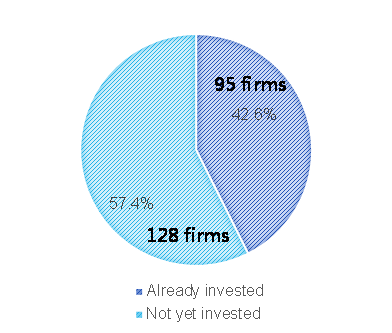In alignment with the global consensus on low-carbon transformation, Taiwan’s electronics and IT industries are making strides toward net-zero emissions. According to a recent survey conducted by the Market Intelligence & Consulting Institute (MIC), 43% of Taiwanese electronics companies have initiated net-zero actions, with larger enterprises (capital exceeding NT$100 million) leading at 66%. The semiconductor manufacturing sector shows the highest participation rate at 69%.
Taiwan’s Electronics Industry: Progress in Net-Zero Commitment (Question: Are Companies Taking Action Toward Net-Zero Carbon Emissions?)

Source: MIC, January 2025
MIC Senior Industry Analyst Angela Huang noted that while customer demands are driving progress, nearly half of the companies remain inactive, constrained by limited internal resources or the absence of external mandates. Huang emphasized that fostering collaboration between central firms and satellite suppliers is key to advancing the industry’s net-zero efforts, as low-carbon transformation is not just a global imperative but also a critical factor for future competitiveness.
MIC’s analysis of greenhouse gas (GHG) inventory progress reveals two significant findings. First, 87% of surveyed companies have initiated or completed Scope 1 and 2 GHG inventories, reflecting organizational emissions. However, only 44% have begun Scope 3 supply chain inspections, mainly due to methodological uncertainties and complexities in evaluating value chain emissions. Huang anticipates that stricter regulations, such as Taiwan’s alignment with IFRS sustainability disclosure standards, will accelerate Scope 3 progress. Second, 31% of companies have launched carbon footprint inventories to mitigate potential carbon tariff impacts. Yet challenges remain, including incomplete emission factor databases and difficulties in tracing primary supplier activities.
The survey also highlights key decarbonization strategies across three areas: process optimization, energy transition, and circular economy. Process improvement is the most favored approach, with top strategies including energy-saving measures (96%), upgrading energy-efficient machinery (91%), enhancing system and equipment efficiency (74%), optimizing production methods (62%), and adopting smart automation (59%). Looking ahead, companies plan to implement energy management systems, with 54% already installing or planning renewable energy facilities. Popular energy strategies include purchasing renewable energy certificates and carbon credits. For the circular economy, green transportation and product redesign are key focus areas.
MIC’s findings on AI-driven decarbonization show limited adoption, with only 14% of companies planning or using AI or generative AI (GAI) for low-carbon initiatives, primarily in smart energy management and automated reporting. The top barriers include a lack of expertise, high technical investment costs, and insufficient supply chain engagement. Huang stated that while AI decarbonization is not a priority for resource-constrained companies, the rising budgets allocated to AI suggest growing confidence and anticipation for its future role in net-zero transformation.
Survey Methodology: Conducted from July 1 to September 30, 2024, using telephone interviews supplemented by fax and email questionnaires. Respondents included staff from corporate sustainability units, IR teams, and CSR reporting departments, with 223 valid samples collected.
About Market Intelligence & Consulting Institute (MIC):
Established in 1987, Market Intelligence & Consulting Institute (MIC) is a division of III (Institute for Information Industry), a major government think tank, and one of the leading IT research institutes in Taiwan. MIC specializes in industry and market research. With over three decades of experience, MIC provides valuable insights and data-driven recommendations to assist businesses in making informed decisions.
For future receipt of press releases, please subscribe here
To know more about MIC's research findings, please access our website at https://mic.iii.org.tw/english/
For inquiries, please contact MIC Public Relations, Catherine Hung, at hungcat@iii.org.tw
If you prefer not to receive notifications, please click here to unsubscribe